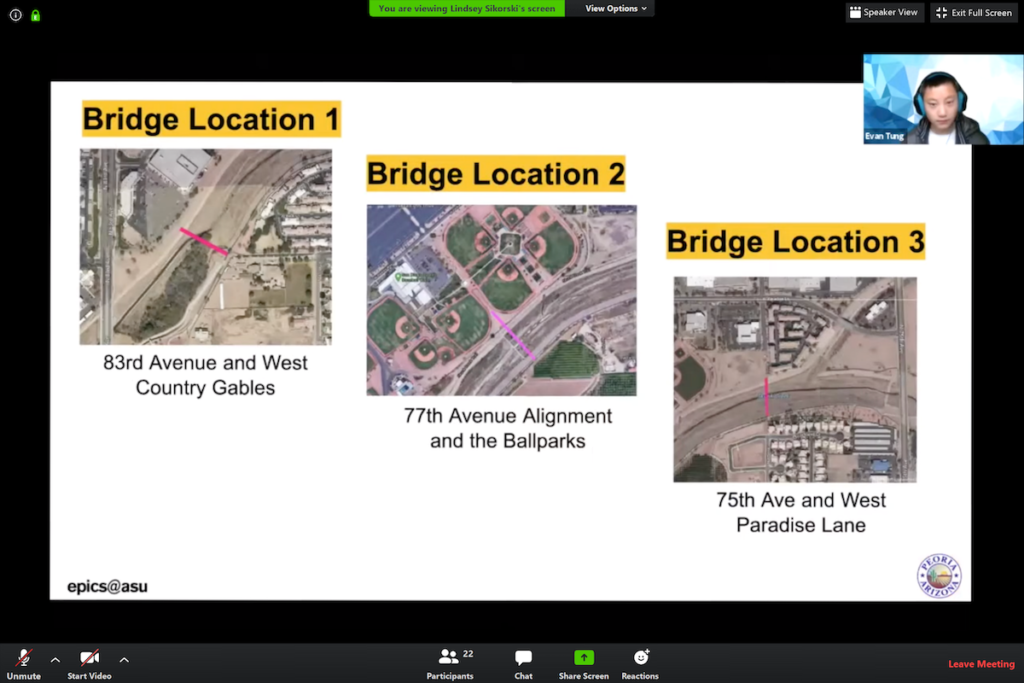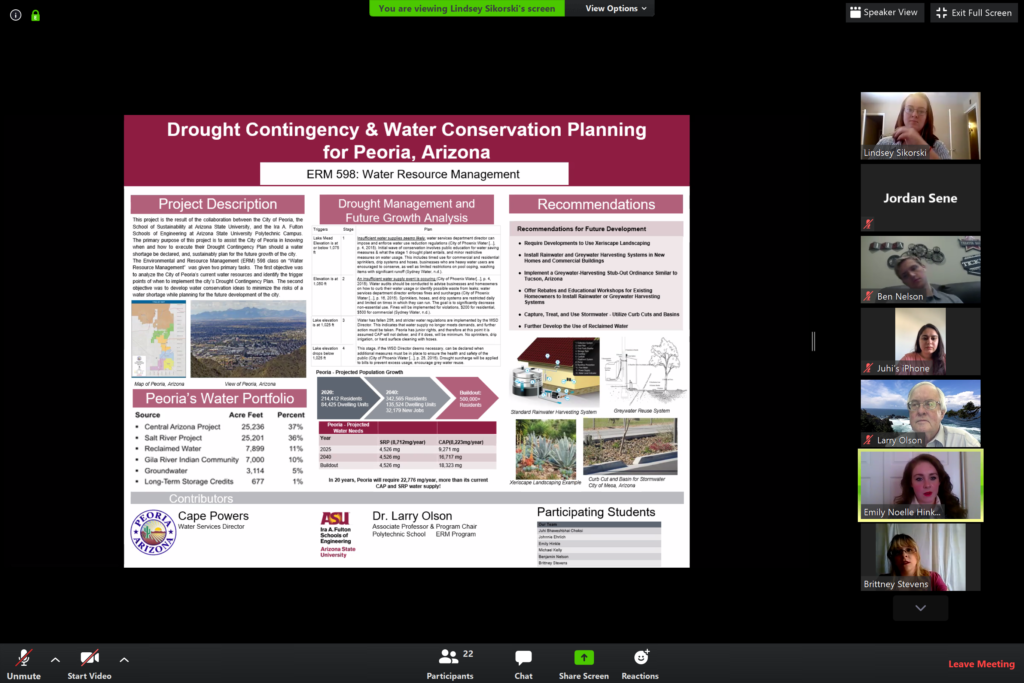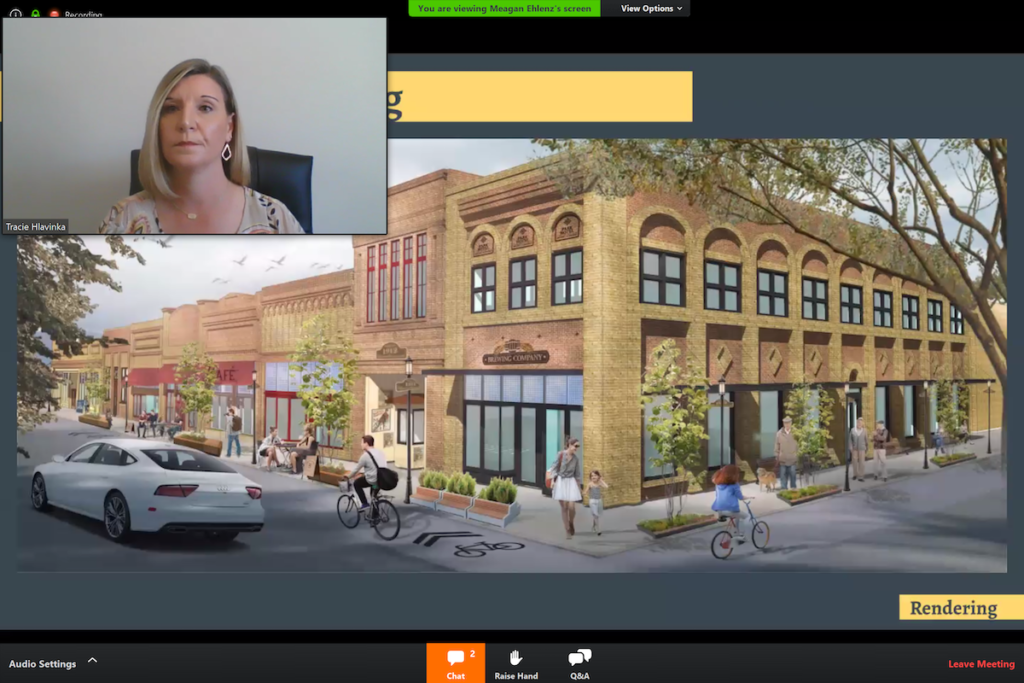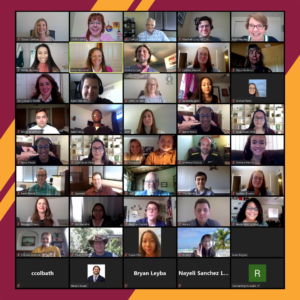On April 29, 2020, ASU Project Cities hosted our first-ever entirely virtual Student Showcase for the Spring 2020 semester. Over one hundred attendees appeared on Zoom throughout the day to learn from this semester’s students and discuss their research findings. The event featured multiple virtual “rooms,” including the main stage presentations and their project findings and breakout Q&A sessions. A virtual “lobby” also remained open throughout the day for tech support, a reception, and networking.
The online showcase featured a mix of 74 graduate and undergraduate ASU students with diverse backgrounds and educational interests. This semester, students partnered with two communities: the City of Peoria, and the Town of Clarkdale on six projects. A video recording of the event is available online here.

City of Peoria
- Sustainability Plan Review with Candice Carr Kelman’s class SOS 321: Policy and Governance for Sustainable Systems. School of Sustainability students examined the Peoria’s Sustainability Action Plan through a wide-reaching benchmarking study and literature review of municipal sustainability plans in Arizona and across the U.S., to generate recommendations for developing the City’s sustainability initiatives further.
- Water Conservation and Shortage Response Messaging with Majia Nadesan’s STC 593: Applied Project class. Denise, a masters capstone student in the Social Technologies program at the New College, pursued her interests in marketing to develop digital content around water conservation initiatives, drafting a mobile app, including virtual reality and other eye-catching aspects. She also analyzed user experience of the community’s web presence to assess the effectiveness of messaging campaigns to mitigate drought in Peoria.
- Water Conservation and Shortage Response Strategy with Larry Olson’s JUS 305: Principles of Justice Studies class. Students in the Polytechnic School’s Environmental Resource Management program applied technical knowledge in water management to determine proactive water conservation measures and water shortage response plans.
- Transit Circulator Best Practices with David Kings’s PUP 598: Transportation and Land Use Planning course. Comparing Peoria’s POGO transit circulator to other programs locally and globally, students in the School of Geographic Sciences and Urban Planning identified issues with the current public transportation challenges such as route and scheduling obstacles and provide recommendations to improve any potential gaps in service.
- Skunk Creek Recreation Corridor Plan with Joshua Loughman’s FSE 104/404: EPICS Gold course. Students in the Fulton School of Engineering’s EPICS program refined the work of the previous semester’s students, by delving into a shortlist of corridor development ideas, then conducting feasibility assessments through a civil engineering lens.

Town of Clarkdale
- Historic Downtown District Revitalization Plan with Meagan Ehlenz and Kim Kanuho’s PUP 580: Planning Workshop. 17 graduate students with the School of Geographic Sciences and Urban Planning conducted public outreach to develop strategic guidance on efforts to revitalize and activate the town’s historic downtown corridor, preserving the community’s historic character, and developing the 89A commercial corridor, to cultivate business opportunities and attract tourism.
We are delighted to mark the completion of the Project Cities program’s 6th semester at ASU, and we couldn’t be more proud of this semester’s students and faculty, especially under the unique challenges posed by the novel coronavirus. This semester, the Sun Devil community has risen to the challenge and proven their resilience, innovation and strength of character. It has been a great privilege to work with our incredible faculty and community teams through the innovative EPIC-N university-community partnership model—and we look forward to continuing this work in the coming semesters!

Project Cities is a member of the Educational Partnerships for Innovation in Communities Network and is administered by ASU’s Julie Ann Wrigley Global Institute of Sustainability and the Sustainable Cities Network. Stay up to date with Project Cities and the Sustainable Cities Network by following us on social media or subscribing to our newsletter.
